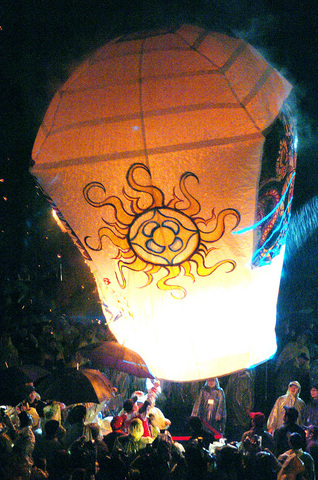It was chilly and rainy in Pingsi, a mountainous township an hour's drive from downtown Taipei, on Saturday night. But Thai singer TAE managed to squeeze a night out of his tight schedule to sing for those who had gathered there for a special occasion.
The event, called "Light of Peace, City of Hope," was held in commemoration for the victims of the Asian tsunami. Participants wrote their wishes or blessings for those affected by the tragedy on lanterns or paper balloons, and set them aloft.

PHOTO: SEAN CHAO, TAIPEI TIMES
TAE was in Taiwan when the tsunami hit nations in Southeast Asia on Dec. 26. His friends called him from Thailand telling him the country was struck by huge waves.
"I thought in my heart: This is impossible. Where did the tsunami come from?' At that time, I was planning to have a vacation in Thailand and go snorkeling. I ended up joining a rescue team on the beach and snorkeling to seek bodies in the sea," TAE told participants at Saturday's event.
TAE, who has often had nightmares after searching for bodies in the sea for a few days, said he still felt the pain of tsunami victims.
"My friends' houses were swept away. When I worked with our rescue team, I saw international rescue teams from South Korea, Taiwan, the US, and other countries. I was moved," he said.
So when TAE received an invitation from Taiwan's Ministry of Foreign Affairs (MOFA) to represent tsunami victims in Thailand by joining the activity in Pingsi, he decided to take a day off from his work because he wanted to say blessings to those suffering from the tragedy.
More than 40 foreign diplomats and their spouses attended the event, which was co-organized by the MOFA and the Taipei County Government at Pingsi Middle School.
Saturday was one of the coldest days of the winter. The temperature dropped to below 8?C. Yet the diplomats, wearing raincoats and holding umbrellas, sat in the rain quietly and watched the night's program for nearly two hours.
"Nearly 300,000 people were killed by the tsunami. More lost their families and were left homeless. It was a disaster in human history," said Vice Minister of Foreign Affairs Quyang Jui-hsiung (歐陽瑞雄).
Every 20 minutes, 100 or 200 lanterns were set aloft at the same time from the playground of the middle school. Despite the rain, the lanterns, with people's wishes written all over them, rose slowly into the sky.
"It was the first time I have joined Pingsi's heavenly lantern activity. On my way here, I saw from the window of my car hundreds of lanterns floating in the dark skies. They are like stars. Suddenly my heart was filled with warmth and joy," said Premier Frank Hsieh (謝長廷), who came to the town to make his wishes as part of the event.
According to the elders of Pingsi, the tradition of setting off heavenly lanterns began during the Ching Dynasty. At that time, bands of outlaws frequently raided villages around Pingsi, forcing local residents to seek refuge in the mountains.
The heavenly lanterns were signals used by the village watchmen to inform the refugees that their houses were safe again. When those hiding in the mountains saw the lanterns in the sky, they knew it was time to go home.
Though the raids ceased long ago, villagers in Pingsi have still preserved the tradition of setting off heavenly lanterns, the elders said. Hsieh, who led the foreign diplomats in setting off their lanterns, said he hoped the countries' political parties can cooperate.
"Cooperation between political parties can bring Taiwan further prosperity," he said before lighting a 5.5m-high heavenly lantern, the largest set aloft that night.

Taiwan has received more than US$70 million in royalties as of the end of last year from developing the F-16V jet as countries worldwide purchase or upgrade to this popular model, government and military officials said on Saturday. Taiwan funded the development of the F-16V jet and ended up the sole investor as other countries withdrew from the program. Now the F-16V is increasingly popular and countries must pay Taiwan a percentage in royalties when they purchase new F-16V aircraft or upgrade older F-16 models. The next five years are expected to be the peak for these royalties, with Taiwan potentially earning

STAY IN YOUR LANE: As the US and Israel attack Iran, the ministry has warned China not to overstep by including Taiwanese citizens in its evacuation orders The Ministry of Foreign Affairs (MOFA) yesterday rebuked a statement by China’s embassy in Israel that it would evacuate Taiwanese holders of Chinese travel documents from Israel amid the latter’s escalating conflict with Iran. Tensions have risen across the Middle East in the wake of US and Israeli airstrikes on Iran beginning Saturday. China subsequently issued an evacuation notice for its citizens. In a news release, the Chinese embassy in Israel said holders of “Taiwan compatriot permits (台胞證)” issued to Taiwanese nationals by Chinese authorities for travel to China — could register for evacuation to Egypt. In Taipei, the ministry yesterday said Taiwan

‘LIKE-MINDED PARTNER’: Tako van Popta said it would be inappropriate to delay signing the deal with Taiwan because of China, adding he would promote the issue Canadian senators have stressed Taiwan’s importance for international trade and expressed enthusiasm for ensuring the Taiwan-Canada trade cooperation framework agreement is implemented this year. Representative to Canada Harry Tseng (曾厚仁) in an interview with the Central News Agency (CNA) said he was increasingly uneasy about Ottawa’s delays in signing the agreement, especially as Ottawa has warmed toward Beijing. There are “no negotiations left. Not only [is it] initialed, we have three versions of the text ready: English, French and Mandarin,” Tseng said. “That tells you how close we are to the final signature.” Tseng said that he hoped Canadian Prime Minister Mark Carney

The US’ joint strikes with Israel on Iran dismantled a key pillar of China’s regional strategy, removing an important piece in Beijing’s potential Taiwan Strait scenario, said Zineb Riboua, a senior researcher at the Hudson Institute’s Center for Middle East Peace and Security. In an article titled: “The Iran Question Is All About China,” Riboua said that understanding the Iran issue in the context of China’s “grand strategy” is essential to fully grasp the complexity of the situation. Beijing has spent billions of dollars over the years turning Iran into a “structural strategic asset,” diverting US military resources in the